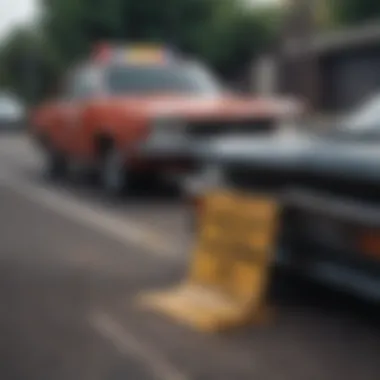How to Retrieve a Towed Car: A Comprehensive Guide


Intro
Retrieving a towed vehicle can be an overwhelming experience, especially if it is your first time. Understanding the nuances of the towing process is essential not only for recovering your car but also for preventing future mishaps. This section provides a foundation for what you need to know regarding vehicle towing, including applicable coverage options and important considerations.
When a vehicle is towed, it is often due to legal infractions such as parking violations or being abandoned. However, various circumstances exist that may provoke a towing situation. It's vital to grasp the legal implications that accompany such incidents, including potential fees and steps to reclaim one’s vehicle.
Coverage Options
In today's world, car owners are often overwhelmed with choices when it comes to insurance and coverage options. Understanding these options can be a powerful tool for safeguarding against unexpected towing incidents.
Types of Coverage Available
There are several types of insurance coverage that can play a crucial role in mitigating the financial burden of a vehicle tow. Some of the notable coverage options include:
- Comprehensive Coverage: This type covers damages not resulting from a collision. If your car is stolen or vandalized, you can file a claim.
- Collision Coverage: This insurance pays for damage to your vehicle when involved in a crash, regardless of fault.
- Emergency Roadside Assistance: This can come in handy. It helps cover the costs associated with towing your vehicle if it breaks down.
Liability Coverage Explained
Liability coverage is primarily aimed at protecting other parties if you are deemed at fault for an accident. Understanding how liability works can help you assess your financial exposure in the event of a tow after an accident. It’s worth noting that liability coverage does not cover your vehicle for towing claims.
Key Considerations
When selecting an insurance policy, various factors come into play. It may seem straightforward, but there are critical elements that merit consideration to avoid future complexities.
Factors to Assess When Choosing Insurance
- Premium Costs: Evaluate how much premium you are ready to pay monthly or annually and the coverage it offers.
- Deductibles: Understand what you must pay out of pocket before your insurance kicks in.
- Company Reputation: Research and review potential insurance companies before committing.
- Coverage Limits: Understanding your policy's limits can prevent unwelcome surprises.
Understanding Policy Limits
Every insurance policy has limits which refer to the maximum amount the insurer will pay for a particular loss. Being aware of these limits is crucial, as they can affect you financially if your claim exceeds them. For example:
- Property Damage Liability: There are maximum amounts for damages to other vehicles or property.
- Medical Payments Coverage: Limits on medical expenses for injuries sustained in an accident can also affect your out-of-pocket costs.
"Understanding your insurance options and limits enhances preparedness when facing potential vehicle towing."
Understanding Vehicle Towing
Understanding vehicle towing is critical for anyone who owns a car. When a vehicle is towed, it can create confusion and frustration for the owner, often leading to delays and unexpected expenses. This section will detail what a towing situation constitutes and the reasons behind towing incidents, all while emphasizing the legal framework that guides these actions. It is paramount for vehicle owners to be aware of their rights and responsibilities regarding towing. Familiarity with this topic helps mitigate misunderstandings and eases the retrieval process once a vehicle has been towed.
What Constitutes a Towing Situation
A towing situation typically occurs when a vehicle is removed from a location by a towing company at the request of a property owner or governmental agency. This can include both voluntary and involuntary situations. Involuntary towing happens when a vehicle is parked in violation of local laws or regulations. Conversely, voluntary towing occurs when an owner requests towing services, such as when the car is disabled.
The Common Reasons for Towing
Towing situations arise from various circumstances. Here are the most common reasons:
Illegal Parking
Illegal parking is one of the leading causes for towing. This includes parking in no-parking zones, blocking driveways, or parking in spaces reserved for specific vehicles like handicapped spots without proper credentials. The enforcement of illegal parking is crucial for maintaining order and safety on public roadways. Failing to comply with these regulations can result in incurring towing fees along with local fines.
Expired Registration
When a vehicle’s registration has lapsed, it might attract towing. Authorities often routinely check for up-to-date registrations in public areas. This practice discourages car owners from neglecting their responsibilities regarding vehicle documentation. If owners fail to renew their registration in a timely manner, they risk losing their vehicle to towing, which can add unnecessary complication to their daily routines.
Abandoned Vehicles


Abandoned vehicles are another common reason for towing. These are typically cars left unattended for extended periods, often in public or private spaces. Such vehicles can pose safety hazards or violate local ordinances regarding property maintenance. Local authorities often take action to remove these vehicles, allowing spaces to be used appropriately, promoting neighborhood safety and aesthetics.
Legal Framework Surrounding Towing
Towing is governed by a variety of legal frameworks, which can vary significantly between different regions. Understanding this framework is necessary to navigate the towing process effectively.
Local Ordinances
Local ordinances play a crucial role in defining towing practices. Many municipalities adopt specific rules regarding when and how vehicles can be towed. These regulations are designed to protect property rights while ensuring that public safety is upheld. Vehicle owners should familiarize themselves with local laws to remain compliant and avoid potential towing incidents. Knowledge of local ordinances enables car owners to challenge wrongful towing, should the situation arise.
Towing Company Regulations
In addition to local ordinances, towing companies are subject to specific regulations set by state and local governments. These regulations typically cover how a towing company operates, including licensing, fee structures, and notice requirements. Understanding these regulations can help vehicle owners recognize their rights when dealing with towing companies, especially concerning fees and the retrieval process. Proper knowledge can empower car owners to engage effectively with these businesses.
Locating Your Towed Car
Locating your towed car is a crucial step in the recovery process. Knowing where your vehicle is situated will save time and reduce stress. You may face various challenges, like different towing companies or legal requirements. Addressing this section informs vehicle owners of practical strategies to find their car and navigate the ensuing steps efficiently.
Identifying the Towing Company
Contacting Local Authorities
When you suspect your vehicle has been towed, calling local authorities is a fundamental first step. Police departments and municipal parking authorities frequently maintain records of towed vehicles. By reaching out to them, you gain access to reliable information about the towing company holding your car. This method is effective as local law enforcement works closely with towing companies.
One major advantage of this approach is that it costs nothing, while also providing legitimate details. However, you might face long wait times on the phone or be redirected to different departments based on the jurisdiction of your vehicle's location.
Using Online Resources
In today's digital age, utilizing online resources to locate your towed car has become increasingly popular. Many towing companies have online databases or listings where you can search for your vehicle. This is a time-saving alternative to waiting for a response from local authorities.
The key feature of using online resources is the immediate access to information. It provides you with names and contact numbers of towing companies. However, one drawback is the potential for outdated or inaccurate information. Therefore, it is essential to verify this data against local authority information.
Validating Towing Information
Once you've identified the towing company, validating the towing information that you've received is vital. Should you find discrepancies in the information, having verified details can help clarify your situation.
Check for the following when validating:
- Tow date and time: Ensure this matches your records.
- Location details: Confirm where your vehicle is currently kept.
- Contact information: Make sure the towing company's phone number and address are correct.
Correct details simplify the retrieval process. This can facilitate faster communication with the towing company and expedite your vehicle's recovery.
Understanding Towing Fees
When dealing with a towed vehicle, understanding the associated towing fees is crucial. These fees can vary widely depending on several factors, such as the towing company, the location, and the specific circumstances surrounding the tow. Vehicle owners must grasp the financial implications to navigate the recovery process effectively. Not only does this knowledge equip you to plan your finances better, but it can also shield you from potential exploitation by unscrupulous towing companies.
Typical Costs Involved
Towing costs generally include several standard fees. The initial towing fee is typically charged when your vehicle is first towed. This can vary depending on the time of day, with higher fees for off-hours or weekends. Additionally, there might be mileage fees that apply for each mile your car is taken from the original parking spot to the towing yard.
Most cities have a maximum allowable fee established by local regulations to help prevent overcharging. It’s essential to consult local ordinances to know what the limits are in your area.
Here are some common elements of towing fees:
- Base towing fee: Charged for the actual towing service.
- Mileage fee: Costs based on distance from the towing site to the impound lot.
- Drop fee: In some cases, if you reach the scene before the towing is completed, you may have to pay a drop fee to the tow truck operator.
Potential Additional Charges
Additional charges can accumulate quickly when retrieving a towed vehicle. Two main fees to anticipate are storage fees and impound fees.


Storage Fees
Storage fees apply when your vehicle is held in a towing company’s lot. These costs can increase daily, depending on popular practices in the area. Storage fees serve as an incentive for vehicle owners to retrieve their cars promptly.
Key characteristic: Storage fees are typically charged on a daily basis. These ongoing fees can contribute significantly to the overall cost of retrieving your vehicle.
Benefits: While infrequent, some people may find these fees reasonable when considering the need to secure an impounded vehicle. It is better to keep the car safely out of harm’s way rather than abandon it.
Impound Fees
Impound fees differ from standard towing charges as they specifically relate to the administrative costs incurred by towing authorities for managing vehicles that have been towed. This might involve processing paperwork or maintaining records about the vehicle’s impoundment.
Key characteristic: Impound fees can often be levied on a per-day basis or might involve a one-time processing fee.
Contribution to overall goal: Being aware of these charges is vital as they add another layer of cost on top of the base towing fee. Knowing what to expect can minimize financial surprises and enhance confidence during the retrieval process.
In summary, understanding towing fees is essential for any vehicle owner who may encounter a towing situation. Familiarizing yourself with typical costs involved and potential additional charges prepares you for a more efficient recovery of your vehicle.
The Car Retrieval Process
Retrieving your car after it has been towed can be a daunting task. Knowing the process can significantly ease your experience. Understanding the steps involved can prevent added confusion and potential mistakes. This section aims to break down the retrieval process, highlighting essential steps to facilitate a smooth recovery of your vehicle.
Required Documentation
Proof of Ownership
Proof of ownership is crucial when attempting to retrieve your towed vehicle. This document confirms that you legally own the car in question. The key characteristic of proof of ownership is that it establishes your right to reclaim the vehicle. Common forms of proof include a vehicle title, registration documents, or a bill of sale.
Many towing companies require this documentation to avoid disputes over ownership. A well-documented proof of ownership is a beneficial choice for this process as it streamlines interactions with the towing company. However, if you cannot provide adequate proof, it may delay the retrieval of your vehicle, making this a critical aspect of the process.
Identification
Identification is another essential document needed when recovering your towed car. It verifies your identity and links you to the ownership documents presented. Typically, a government-issued ID such as a driver’s license is needed. The key characteristic of identification is that it helps ensure the person reclaiming the vehicle is the rightful owner.
Having proper identification is a beneficial aspect as it adds a layer of security to the retrieval process. However, forgetting to bring an ID could result in being denied access to your vehicle, illustrating its importance in the overall scheme of retrieving a towed car.
Steps to Retrieve Your Vehicle
Contact the Towing Company
The first step in the retrieval process is to contact the towing company. Doing so provides you with crucial information about your vehicle's location and the fees that may be involved in its release. The key characteristic of contacting the towing company is immediate access to information regarding the status of your vehicle.
This step is beneficial because it allows you to prepare for subsequent steps, such as gathering the necessary documentation. However, if you delay this contact, it may lead to additional fees or complications, which is something to keep in mind.
Sign Necessary Paperwork
Once you have established contact with the towing company, you must be prepared to sign necessary paperwork. This paperwork often includes an agreement regarding payment and liability. The key characteristic of this step is that it creates a legal acknowledgment of your intent to reclaim the vehicle.
Signing the necessary paperwork is advantageous as it makes the process official and prevents misunderstandings later on. Not signing could lead to delays or refusal of service, emphasizing the need to carefully complete this phase of the retrieval process.
Make Payment
The final step involves making the payment required to release your vehicle. Payments can typically be made via various methods, including cash, credit card, or other accepted forms. The key characteristic of making payment is that it finalizes the agreement and allows you to take ownership of your vehicle again.
This step is beneficial because, without payment, you will not be able to reclaim your car. However, being unprepared for the potential costs involved can result in frustration and delays, showing the importance of budgeting for towing fees.
Always be mindful of keeping all receipts related to towing fees as they may be useful for future reference or disputes.


Post-Retrieval Considerations
Post-retrieval considerations are crucial for vehicle owners who have just got their towed vehicle back. It is not just about getting the car back but also ensuring its condition and understanding one's legal standing. This section aims to outline what to do after retrieving your vehicle. By paying attention to specific factors, vehicle owners can safeguard their interests and prevent future inconveniences.
Inspecting for Damage
After retrieving your car, the first thing you should do is conduct a thorough inspection of the vehicle. Towing can sometimes result in physical damage. Look for dents, scratches, or any signs of mishandling. Check the tires, alignment, and any mechanical issues that may arise.
- Take Pictures: Document any noticeable damage as evidence. This can be useful if you need to report the issue to the towing company or seek compensation later.
- Check for Missing Items: Sometimes valuable items are left inside the vehicle. Make a note of any missing belongings to report to the towing company.
- Functional Check: Ensure that all vehicle functions work correctly—like lights, brakes, and engine performance.
If you find damage, gather evidence promptly and reach out to the towing company. This is essential as they may have policies regarding the liability for damages during the towing process.
Understanding Your Rights
Knowing your rights as a vehicle owner is key. The towing process can sometimes make individuals feel powerless. However, you have specific entitlements, especially concerning billing practices and damage claims.
- Review Local Towing Laws: Each region typically has laws governing towing practices. Familiarize yourself with these rules. Understanding your local laws helps clarify whether the towing company acted accordingly.
- Dispute Unfair Fees: If you believe the fees charged are excessive or unjustified, you can contest them. Know the limits set by local laws for towing and storage fees.
- Document Everything: Keep all related documentation, such as receipts and correspondence with the towing company. This may prove helpful if you decide to pursue any disputes with local authorities or seek legal advice.
It is advisable to contact local consumer protection agencies if you encounter any issues that cannot be resolved directly with the towing company.
Being informed about your rights allows for a clearer path forward. Both the inspection of your vehicle and the understanding of legal rights will equip you better for handling situations that arise post-retrieval.
Preventative Measures
Preventative measures are essential to avoid the inconvenience and costs associated with retrieving a towed vehicle. By understanding the aspects of vehicle ownership and local regulations, owners significantly reduce the risks of towing. Implementing proactive strategies not only keeps your car where it should be but ensures your peace of mind while you are away.
Understanding Local Parking Regulations
Familiarity with local parking regulations is crucial for any vehicle owner. Each city or town has its own set of rules that dictate where and when a vehicle can be parked. Those who disregard these regulations may find themselves facing towing fees and inconveniences. Owners should make it a habit to review the posted signs in parking areas, as they often contain specific information regarding legal parking spaces and restrictions. Additionally, understanding time limits and permit requirements can prevent unwanted towing incidents. Being informed empowers vehicle owners to make better decisions regarding their parking habits.
Regular Vehicle Maintenance
Regular vehicle maintenance is an often-overlooked aspect of preventing towing situations. Maintaining proper vehicle condition helps ensure that your car will not become immobile in an unauthorized area due to mechanical failure. Regular checks on tires, brakes, and other crucial components can prevent breakdowns that may lead to towing.
Besides that, keeping registration and insurance up to date is vital. It is not uncommon for vehicles to be towed when registration has expired. Scheduled check-ins on vital documents can help mitigate these risks. However, it’s important to note that vehicle maintenance not only enhances vehicle reliability but also prolongs its lifespan.
Using Technology to Avoid Towing
In today’s digital age, leveraging technology becomes an effective method to avoid towing. There are various tools available that aid vehicle owners in adhering to parking regulations and enhancing situational awareness.
Parking Apps
Parking apps simplify the parking process. These applications often provide features that help locate available parking, show local parking rules, and even send alerts when parking time limits are nearing expiration. A key characteristic of these apps is their real-time updates and GPS capabilities, which contribute to a more informed parking experience. Some popular options include SpotHero and ParkMobile. These apps are widely used because of their ease of use and efficiency. The unique feature of these apps lies in their data-driven approach, allowing users to make informed decisions and avoid needless fines and towing. However, potential disadvantages can occur, like limited access depending on the area or potential subscription fees associated with premium services.
Local Alerts
Local alerts provide timely updates regarding parking regulations and restrictions that could change based on events or weather. Notifications can be received through mobile applications or through municipal websites. This characteristic makes local alerts a valuable tool for vehicle owners who wish to remain informed about potential issues that might arise. The main advantage is that it enables proactive measures to avoid violations, while the downside may include delayed notifications or incomplete data in some instances. Regardless, local alerts serve as a practical resource for avoiding unforeseen towing situations.
With these preventative measures, vehicle owners can safeguard themselves against the inconveniences of towing and further maintain their vehicles. By understanding local regulations, keeping up with maintenance, and utilizing technology, they create a responsible vehicle ownership approach.
End
Retrieving a towed car can be a perplexing experience for many vehicle owners. Understanding the process involved is essential for navigating this often-stressful situation. This guide provides a systematic approach to reclaiming your vehicle while highlighting the necessary steps and considerations.
Summing Up the Retrieval Process
The retrieval of a towed vehicle encompasses several key stages. Initiating contact with the appropriate towing company is the first crucial step. Having the relevant documentation, such as proof of ownership and identification, is necessary to ensure a smooth recovery. Realizing the expected fees, including any potential additional charges, allows for better financial planning as well. Once the required paperwork is duly signed, making payment concludes the official retrieval process. It is important to keep a record of all communications and transactions for future reference. Understanding each step not only clarifies the process but also helps mitigate frustration during a time that can be emotionally charged.
Encouragement to Stay Informed
Staying informed about towing regulations and vehicle maintenance is vital for all car owners. Regularly reviewing local parking rules can prevent unnecessary towing incidents. Additionally, investing time in maintaining your vehicle’s condition can help avoid scenarios where your car might get impounded due to previous issues. Utilizing technology, such as parking apps, can aid in finding suitable parking spaces and provide real-time alerts on local regulations. Being proactive equips vehicle owners with knowledge and tools to navigate the potential complexities of car ownership. Regular inquiries about the latest local ordinances can further enhance one’s awareness and readiness.
"Knowledge not only empowers but also prepares you for unforeseen circumstances involving your vehicle."
In summary, understanding how to retrieve your towed vehicle not only involves knowing the steps to reclaim it but also entails cultivating awareness of the broader landscape of vehicle regulations and care.



